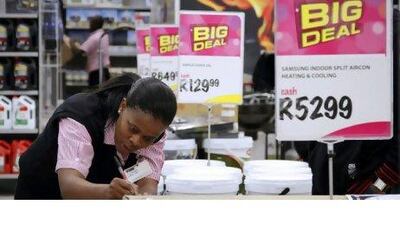The US retail giant has quickly discovered that its first venture on the continent is riddled with challenges — not to mention shotgun-wielding security guards
If Walmart is to make a success of its proposed African venture it will have to get used to a whole new style of business that includes in-store shotgun-wielding security guards and unions that go on strike at the drop of a hat.
The US retail giant has offered 16.5 billion rand (Dh8.77bn) for a 51 per cent share in South Africa's Massmart, which operates 288 low-cost stores in 14 African countries. This will be Walmart's first investment on the continent and one of the largest foreign retail takeovers.
With the ink barely dry on its offer, Walmart is already getting a taste of what it is in for. Last week, 80,000 workers at all South Africa's major retailers went on strike to demand centralised wage bargaining.
At the same time, members of the South African Commercial, Catering and Allied Workers' Union, which claims to represent 70 per cent of Massmart employees, launched an anti-Walmart coalition. The union says it will try to block the takeover unless Walmart meets its demands, which include permanent jobs for Massmart's 6,000 casual workers, the reinstatement of more than 1,500 employees retrenched this year and guaranteed levels of local procurement.
Unions fear the global retailer will replace local suppliers with cheap imports from China. They especially worry that Walmart's well-documented anti-union stance in North America will be introduced.
Grant Pattison, the chief executive of Massmart, has tried to placate critics of the deal and said the company would retain its local listing and South African management. He also hinted that the US company would leave it to the locals to manage both the unions and the business environment.
"What isn't going to happen is a bunch of Walmart people around here start running the company," Mr Pattison said.
Whatever initial hiccups the company may have, its venture may reflect a growing interest by large US corporations attracted by Africa's fast-growing economies and middle class, analysts say.
"Africa is the untold story and could be the big story of the next decade, like India and China were this past decade," Muhtar Kent, the chief executive of Coca-Cola, said in Bloomberg Business Week recently. Coke, which has a long-established presence south of the Sahara, is currently on an investment drive of its own.
"You've got an incredibly young population, a dynamic population. Huge disposable incomes. I mean, US$1.6 trillion [Dh5.87tn] of GDP, which is bigger than Russia, bigger than India," Mr Kent said.
Flat sales at home have only added to the urgency of global expansion for Walmart.
Last month, the retailer said its international sales outpaced US business during the last quarter, rising 9.3 per cent to $26.9bn against the same period a year ago. A recent report by McKinsey notes that Africa's GDP will reach $2.6tn by 2020 and consumer spending will rise to $1.6tn.
Still, it won't be easy. Apart from union opposition, Walmart will encounter fierce competition, not least from South African retail chains that are expanding rapidly northwards themselves.
Pick n Pay, South Africa's second-largest food retailer with 26 stores in other countries on the continent, says it plans four new stores in neighbouring Zambia over the next 12 months and will enter Mauritius, Malawi and Mozambique during the same period.
"Competition is going to be tough," Nick Badminton, the chief executive,told Reuters.
"Walmart is a big, big gorilla but it is not unbeatable."
But the biggest adjustment may be getting used to local quirks. One of Massmart's most successful subsidiaries is Jumbo, a vast warehouse of cheap goods in downtown Johannesburg that attracts small traders from all over Africa.
These traders pay cash and cart their goods back home in trucks, buses and trains. Instead of friendly greeters at the doors, something of a Walmart trademark, Jumbo employs hard-eyed men with shotguns to discourage ever-present criminal gangs.
Whatever the challenges, though, Walmart probably feels that the 15 per cent premium it paid for Massmart is worth the price. Doug McMillon, the Walmart International president and chief executive, said the retailer was committed to its African adventure.
"The more we learn about South Africa and the surrounding countries the more we are convinced that this is an important region with attractive growth characteristics," he said.

